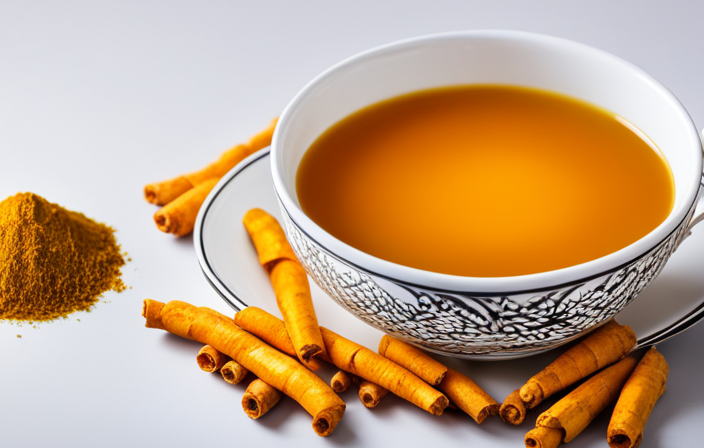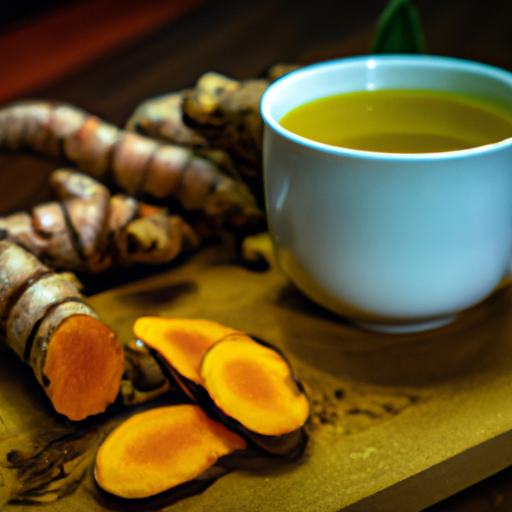Are you wondering about the acidity of turmeric tea? Turmeric has gained popularity for its possible health benefits, but there may be concerns about its impact on the digestive system.
Understanding the acidity of foods and beverages is important because it can impact your digestive system and overall health. Some people may experience discomfort or digestive issues when consuming acidic foods, so it’s important to know the acidity levels of what you’re consuming.
In this article, we’ll explore whether turmeric tea is acidic and what that means for your health. Keep reading to learn more about the acidity of turmeric tea and its potential benefits and drawbacks.
Key Takeaways
- Turmeric tea is generally considered non-acidic and may even help neutralize stomach acid, making it a potential remedy for acid reflux and heartburn.
- However, excessive consumption of turmeric tea may pose health risks, especially for individuals with pre-existing medical conditions, and may cause acid reflux or heartburn for those with sensitive stomachs, especially when consumed in large amounts.
- Turmeric tea contains curcumin, a compound with anti-inflammatory and antioxidant properties, which can help reduce inflammation, improve brain function, and lower the risk of heart disease.
- To enhance absorption, it is recommended to add black pepper and a source of healthy fat such as coconut oil or almond milk, and to consume turmeric tea in moderation between meals. It is also important to consult with a healthcare professional if concerned about potential interactions with medications.
What is Turmeric Tea?
If you’re looking for a warm and cozy drink that’s also packed with health benefits, turmeric tea is the way to go! This herbal tea is made by steeping turmeric root or powder in hot water, along with other spices like ginger and cinnamon.
There are many turmeric tea recipes out there, but they all have one thing in common the vibrant yellow color and earthy flavor that comes from the turmeric. Aside from being a comforting drink, turmeric tea is also known for its numerous health benefits.
Turmeric contains curcumin, a compound with anti-inflammatory and antioxidant properties. Drinking turmeric tea regularly may help reduce inflammation in the body, which can lead to a range of health issues. It may also boost your immune system, improve brain function, and even lower your risk of heart disease.
Now, let’s move on to understanding acidity and how it relates to turmeric tea.
Understanding Acidity
As you sip on a beverage, you might notice a sour taste on your tongue, indicating the presence of acidity. Understanding acidity and alkalinity is crucial in determining the impact of a substance on your health.
Acidity is measured on the pH scale, which ranges from 0 to 14. A pH value of 7 is considered neutral, while values below 7 are acidic and values above 7 are alkaline. Maintaining a balanced pH level is vital for optimal health.
The human body is slightly alkaline with a pH range of 7.35 to 7.45. An acidic environment in the body can lead to various health issues such as inflammation, weakened immunity, and digestive problems. Understanding alkalinity and acidity can help you make informed decisions about the food and drinks you consume and their potential impact on your overall health.
Moving onto the subsequent section about "is turmeric tea acidic?", it’s essential to understand that the pH level of turmeric tea can vary depending on how it’s prepared.
Is Turmeric Tea Acidic?
If you’re wondering whether turmeric tea is acidic, there are a few things to consider. Research studies have explored the pH levels of turmeric and its impact on the body, but findings are not conclusive.
However, experts suggest that turmeric tea is generally considered to be non-acidic and may actually help reduce inflammation in the body.
Research Studies
Research studies have shown that turmeric tea has a neutral pH level and is not considered acidic. This means that it won’t cause any harm to your teeth or stomach lining. In fact, some studies suggest that turmeric tea may even have the ability to neutralize stomach acid, making it a potential remedy for acid reflux and heartburn.
While turmeric tea is generally safe to consume, it’s important to keep in mind the recommended daily intake. Too much turmeric can lead to potential side effects such as nausea, diarrhea, and dizziness. As with any supplement or food, moderation is key.
Now, let’s delve into expert opinions on the topic of turmeric tea’s acidity.
Expert Opinions
Listen up, experts have weighed in on the matter and their advice can help you make informed decisions about your health.
When it comes to the acidity of turmeric tea, expert opinions suggest that it’s generally safe for most people to consume. However, it’s important to note that excessive consumption of turmeric tea may still pose some health risks, particularly for individuals with pre-existing medical conditions.
According to some experts, turmeric tea may cause acid reflux or heartburn for individuals with sensitive stomachs, especially when consumed in large amounts. Additionally, turmeric tea may interact with certain medications, including blood thinners, and may cause adverse effects.
Therefore, if you’re taking any medications or have a history of digestive issues, it’s best to consult with your healthcare provider before adding turmeric tea to your diet.
With these expert opinions in mind, let’s explore the potential benefits of drinking turmeric tea.
Potential Benefits of Drinking Turmeric Tea
As you sip on a warm cup of turmeric tea, you may experience potential health benefits such as reducing inflammation and improving brain function. Turmeric contains curcumin, a natural anti-inflammatory compound that can help alleviate symptoms of conditions such as arthritis and inflammatory bowel disease. Additionally, curcumin has been shown to support the immune system by increasing the production of antibodies and enhancing the activity of immune cells.
Some other potential benefits of drinking turmeric tea include:
- Lowering the risk of heart disease by improving the function of the endothelium, the lining of blood vessels
- Boosting antioxidant activity in the body, which can help prevent cell damage and reduce the risk of chronic diseases
- Improving brain function and reducing the risk of age-related cognitive decline
- Reducing the severity of symptoms of depression and anxiety
- Supporting healthy digestion and reducing symptoms of digestive disorders
Although turmeric tea has many potential health benefits, there are also some potential drawbacks to consider. Let’s take a closer look at these in the next section.
Potential Drawbacks of Drinking Turmeric Tea
While turmeric tea can offer many potential health benefits, it’s important to be aware of possible drawbacks. Some people may experience gastrointestinal issues such as nausea, stomach upset, or diarrhea when consuming turmeric. In rare cases, high doses of turmeric can cause liver damage or ulcers. It’s important to follow the recommended dosage and consult with a healthcare professional if you have any concerns.
Additionally, turmeric may interact with certain medications such as blood thinners or diabetes medication. If you’re taking any prescription medication, it’s important to talk to your doctor before incorporating turmeric tea into your diet.
By being aware of these potential side effects and consulting with a healthcare professional, you can safely enjoy the many benefits that turmeric tea has to offer. Now let’s dive into how to prepare turmeric tea.
How to Prepare Turmeric Tea
Get ready to experience the comforting warmth and golden hue of a delicious cup of turmeric-infused beverage with these easy preparation steps. First, start by brewing a cup of your favorite tea, such as green tea or black tea.
As the tea is steeping, add a teaspoon of turmeric powder or grated fresh turmeric root into a small saucepan. Then, pour in a cup of water and bring it to a boil. Once the water is boiling, reduce the heat and let it simmer for about 5 to 10 minutes.
Finally, strain the turmeric liquid into your brewed tea and add a dash of honey or lemon juice to taste.
Benefits:
- A warm cup of turmeric tea can help soothe sore muscles and joints, reducing inflammation and stiffness.
- Turmeric contains curcumin, a powerful antioxidant that can boost your immune system, support brain function, and protect against chronic diseases like cancer and heart disease.
Variations:
- For a creamier texture, add a splash of coconut milk or almond milk to your turmeric tea.
- Experiment with different spices like cinnamon, ginger, or cardamom to enhance the flavor and health benefits of your turmeric tea.
Now that you know how to prepare a tasty cup of turmeric tea, let’s move on to some tips for maximizing its health benefits.
Tips for Maximizing Health Benefits
To fully reap the health benefits of this golden beverage, it’s important to add black pepper to your turmeric tea. The piperine in black pepper can increase the bioavailability of curcumin by up to 2000%.
Curcumin, the active ingredient in turmeric, has potent anti-inflammatory and antioxidant properties that can help fight off chronic diseases such as cancer and Alzheimer’s. However, its absorption into the bloodstream is low, and adding black pepper can significantly improve its efficacy.
Optimal consumption of turmeric tea involves adding a dash of black pepper and a source of healthy fat such as coconut oil or almond milk. The fat helps dissolve the curcumin and enhances its absorption into the bloodstream.
Additionally, it’s best to consume turmeric tea between meals to avoid interference with the absorption of other nutrients. By following these tips, you can maximize the benefits of turmeric tea and improve your overall well-being.
Moving onto the subsequent section, there are alternative turmeric products that you can explore to reap the health benefits of this versatile spice.
Alternative Turmeric Products
Now that you know how to maximize the health benefits of turmeric, you may be wondering if there are alternative products you can use to incorporate this spice into your daily routine. Luckily, there are many turmeric supplements and recipes that can help you reap the benefits of this powerful herb.
Turmeric supplements come in various forms, including capsules, powders, and extracts. Some popular supplements include curcumin, a compound found in turmeric that has anti-inflammatory and antioxidant properties, and turmeric oil, which can be used topically for skin health.
Additionally, there are many delicious turmeric recipes that can be easily incorporated into your diet, such as turmeric lattes, turmeric smoothies, and turmeric-infused dishes.
As you explore these alternative turmeric products, keep in mind that turmeric tea is also a popular way to consume this spice. In the next section, we’ll explore whether or not turmeric tea is acidic and how it can impact your health.
Turmeric Tea and Your Health
If you’re a health-conscious individual looking for a warm and comforting beverage to enjoy throughout the day, incorporating turmeric tea into your routine could provide a variety of potential health benefits.
Turmeric, a spice commonly used in Indian cuisine, has been studied extensively for its anti-inflammatory and antioxidant properties. Turmeric tea, made by steeping turmeric powder or grated turmeric root in hot water, is an easy and convenient way to incorporate this spice into your diet.
Research suggests that turmeric tea may help reduce inflammation in the body and improve overall immune function. It may also have potential benefits for managing conditions such as arthritis, digestive issues, and even certain types of cancer.
However, it’s important to note that the dosage of turmeric tea needed to achieve these benefits may vary depending on the individual and their specific health needs. As with any supplement or herbal remedy, it’s always a good idea to speak with a healthcare provider before incorporating turmeric tea into your routine.
Frequently Asked Questions
What are some alternative ways to consume turmeric besides tea?
Looking for alternative ways to consume turmeric? Try a turmeric latte or smoothie! Both provide the anti-inflammatory benefits of turmeric without the potential acidity of tea. Enjoy a delicious and healthy boost to your day.
Can turmeric tea be harmful to certain individuals or medical conditions?
Turmeric tea may have potential harm for individuals with certain medical conditions. Consult with a healthcare provider before consuming regularly. Euphemism: It’s important to be mindful of potential risks for some individuals.
How much turmeric should be used when making turmeric tea?
To reap the benefits of turmeric tea, use 1 teaspoon of ground turmeric per cup of water and simmer for 10 minutes. Best time to drink turmeric tea is in the morning or before bedtime.
Can adding honey or other sweeteners affect the acidity of turmeric tea?
Did you know that adding honey or other sweeteners to turmeric tea can actually increase its acidity level? These sweeteners can lower the pH, making it more acidic. It’s important to monitor how much you add to avoid any negative effects.
Are there any known negative interactions between turmeric tea and medications?
When taking medications, it’s important to be aware of potential drug interactions with turmeric tea. Some studies suggest that turmeric may interact with certain medications, including blood thinners and diabetes drugs. It’s best to consult with a healthcare provider to discuss any potential risks.
Conclusion
Congratulations! You’ve made it to the end of this informative article on turmeric tea. So, is turmeric tea acidic? The answer is no, turmeric tea is actually alkaline, which can help balance the pH levels in your body.
Not only is it a tasty and refreshing beverage, but it also has some potential health benefits, such as reducing inflammation and improving digestion.
But wait, there’s more! Before you rush off to make yourself a cup of turmeric tea, it’s important to note that there are also some potential drawbacks to drinking it. For example, it may interact with certain medications and cause stomach discomfort in some people.
It’s always a good idea to talk to your doctor before adding any new supplements or beverages to your diet.
In conclusion, turmeric tea can be a great addition to your daily routine, as long as you are aware of its potential benefits and drawbacks. By preparing it correctly and consuming it in moderation, you can potentially enjoy some health benefits and a delicious drink all at once. So go ahead, give it a try and see how it can fit into your lifestyle.










